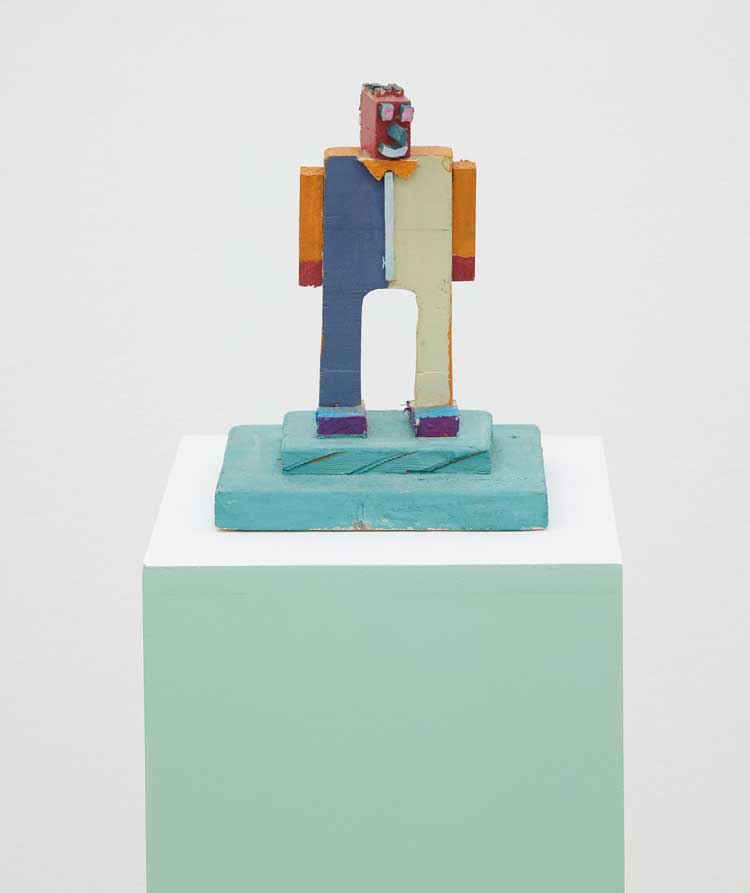

.jpg)
Abdulrazaq Awofeso, Do You Know Who I Am (Iyaloja), 2022. Installation view, Abdulrazaq Awofeso: Out of Frame (2022). Courtesy Ikon Gallery.
Ikon Gallery, Birmingham
10 June – 29 August 2022
by DAVID TRIGG
The humble shipping pallet is integral to the modern global economy, used to transport almost every product we buy and so ubiquitous that it barely warrants a second thought. For Abdulrazaq Awofeso, however, these simple wooden objects provide the primary material for his colourful array of carved sculptures, reliefs and installations currently on display at Birmingham’s Ikon Gallery. Discarded on city streets around the world, the ready availability of pallets makes them an attractive, cost-effective solution for the Nigerian artist, who recently relocated to Birmingham from Lagos, courtesy of a Global Talent visa. But the commonplace devices also form the conceptual anchor of Awofeso’s practice, standing as a metaphor for migration and the global movement of people, including his own journeys between Nigeria, South Africa and Europe.
.jpg)
Abdulrazaq Awofeso, Skhothane, 2021-22. Installation view, Abdulrazaq Awofeso: Out of Frame (2022). Courtesy Ikon Gallery.
Although every work in this elegantly restrained exhibition is made from scavenged pallets, the socio-political significance of Awofeso’s material is quickly eclipsed by the gentle humanity that pervades the opening installation, Do You Know Who I Am (2022). Hovering somewhere between paintings and portrait busts, this motley collection of relief sculptures portrays people the artist met during a fraught return flight to Birmingham from Lagos in December 2021, when Nigeria was suddenly added to the UK’s Covid travel red list. Celebrating the randomness of encounter that Awofeso experienced while being held in Amsterdam, the installation introduces us to a host of intriguing individuals, including Iyaloja and her enormous head wrap, Kutaba with his shaggy hair and pink shades, and an elderly flat-capped gentleman known simply as Blinder.
.jpg)
Abdulrazaq Awofeso, Komole (bridal train), 2022. Installation view, Abdulrazaq Awofeso: Out of Frame (2022). Courtesy Ikon Gallery.
Constructed from just a few simple carved forms, each of the 31 faces are incredibly characterful. Most notable, though, are their unnatural skin tones, which range from shades of cerulean, mauve and crimson to ash and amber. This positions the figures as citizens of the world rather than any specific locale – a conscious decision reflecting Awofeso’s uneasiness about the capitalisation of the black figure in African art. While the work’s backstory highlights how the modern world has made us more connected than ever, the individual shelves that the figures occupy suggests a certain alienation; these travellers are all together yet also separate, perhaps even lonesome. In contrast, the conviviality of the nearby relief, Komole (bridal train) (2022), celebrates togetherness. Painted on to wooden slats, it depicts a group of women dancing at a wedding; a large, colourful narrative that perhaps hints at a future direction for Awofeso’s reliefs.
In the second room, a dance battle is seemingly about to explode into life in Skhothane (2021-22), which presents two factions of freestanding figures facing one another on plinths. Highly stylised and charmingly unrefined, each character is formed from geometric blocks and painted with Awofeso’s trademark bright colours. As with the portraits, they eschew racial categorisation, with some even appearing more robotic than human. Each character is well turned out and many are wearing ties and waistcoats along with stylish shoes, hats, shades and headphones. These are street savvy individuals with a refined taste in clothing.

Abdulrazaq Awofeso, Skhothane, 2021-22 (detail). Installation view, Abdulrazaq Awofeso: Out of Frame (2022). Courtesy Ikon Gallery.
The work’s title, Skhothane, refers to a South African youth culture notorious for its ostentatious flaunting of wealth and wanton destruction of designer clothing and other luxury items in exuberant dance-offs. Yet the dapper attire of many figures recalls La Sape, a subculture prevalent in the Democratic Republic of the Congo that draws on the elegance, style and manners of colonial-era dandy fashion imported from the west. In this convergence, Awofeso seems less interested in depicting a specific social movement than in evoking a broader sensibility in Africa, whereby fashion and other western signifiers of prosperity are appropriated as defiant tools of decolonisation, leading to the emergence of new identities that resist easy categorisation.
-(2022).jpg)
Abdulrazaq Awofeso, Avalanche of Calm, 2021–22 (detail). Installation view, Abdulrazaq Awofeso: Out of Frame (2022). Courtesy Ikon Gallery.
Awofeso is certainly not the first artist to make use of reclaimed materials such as wooden pallets. The Japanese artist Tadashi Kawamata springs to mind, as does American sculptor Paul Villinski and Ghanaian artist El Anatsui, but there is little here that could be considered derivative. The closest Awofeso comes is in the huge floor-bound installation, Avalanche of Calm (2021–22), in which a sea of 3,000 tiny carved figures recalls Antony Gormley’s celebrated Field for the British Isles (1993). As with all the works in this exhibition, it is imbued with a sense of anticipation; the crowd appear to be waiting, perhaps for a concert, a religious service, or simply information about a delayed flight. Floating above the multitude is a cluster of wooden clouds painted blue with large, gestural brushstrokes. They nod to the changeable British weather – still something of a novelty for the young Nigerian artist – but their presence is foreboding, suggestive of something more ominous.
Awofeso’s exhibition forms part of Ikon’s Arrivals programme, which focuses on the international movement of people and ideas and is organised to coincide with the 2022 Commonwealth Games being held in Birmingham this summer. While Awofeso’s visa allows him to stay here for five years, his rights beyond that are uncertain. Recent events have seen a harshening of the already hostile environment for refugees, migrants and asylum seekers in the UK, and while Avalanche of Calm suggests the strength of the human spirit in adversity, the storm brewing above the crowd evokes the uncertainty that so many, including Awofeso, face regarding the future.